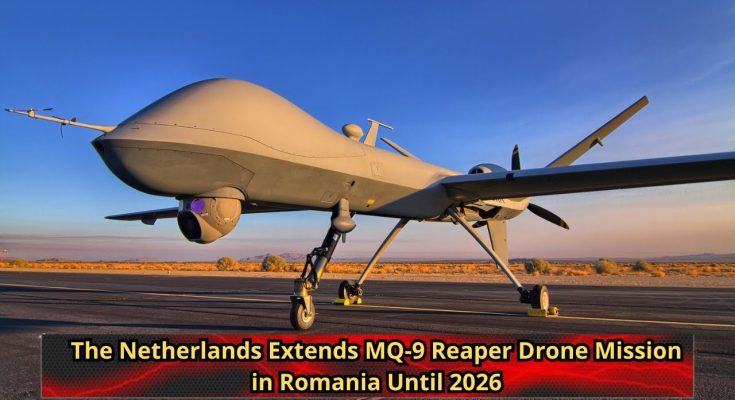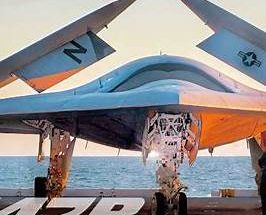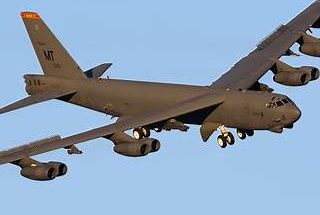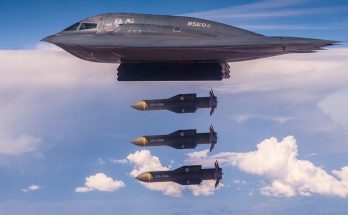In a significant move to bolster NATO’s defense capabilities in Eastern Europe, the Netherlands has extended its deployment of the MQ-9 Reaper drone in Romania until 2026. This extension reflects both the strategic importance of the region and the growing role of unmanned aerial vehicles (UAVs) in modern military operations. The MQ-9 Reaper, one of the most advanced drones in the world, plays a pivotal role in surveillance, reconnaissance, and targeted strike operations, making it a crucial asset in the evolving security environment of Europe.
Background of the MQ-9 Reaper Mission in Romania:
The Netherlands first deployed its MQ-9 Reaper drones to Romania in 2022, under the auspices of NATO’s broader mission to enhance security and deterrence along its eastern flank. Romania, located in close proximity to Russia, has been at the center of NATO’s efforts to bolster defenses against potential Russian aggression, especially in the wake of Russia’s 2022 invasion of Ukraine. The MQ-9 Reaper drones are based at Mihail Kogălniceanu Air Base near the Black Sea, a strategic location that allows for rapid surveillance of the region and quick reaction to any emerging threats.
The Netherlands’ decision to extend the mission is a response to the ongoing geopolitical tensions in the region. With the Russian military continuing its aggressive stance in Ukraine and the broader Eastern European region, NATO has prioritized strengthening its defensive posture in countries like Romania, which border the Black Sea and are key to securing NATO’s southern flank.
Capabilities of the MQ-9 Reaper:
The MQ-9 Reaper, developed by General Atomics, is renowned for its high-endurance and versatile capabilities, making it a perfect fit for operations in the volatile region of Eastern Europe. The drone is equipped with sophisticated surveillance and reconnaissance systems, including synthetic aperture radar (SAR) and electro-optical/infrared (EO/IR) sensors. These technologies allow the Reaper to gather critical intelligence in real-time, even under challenging weather conditions or in areas with limited visibility.
In addition to its surveillance capabilities, the MQ-9 Reaper is armed with a variety of precision-guided munitions, such as Hellfire missiles and GBU-12 Paveway II laser-guided bombs, enabling it to conduct targeted strikes if necessary. Its ability to stay airborne for extended periods—up to 27 hours—makes it an invaluable asset for providing continuous coverage of critical areas, especially in volatile regions like the Black Sea and Ukraine’s border areas.
Role of the Netherlands in NATO’s Eastern Defense Strategy:
The Netherlands has long been an active contributor to NATO’s defense strategy, and its decision to extend the MQ-9 Reaper mission in Romania is a reflection of its commitment to regional stability and collective security. The extended presence of Dutch drones in Romania ensures that NATO has a reliable, high-tech surveillance platform that can monitor potential threats from Russia, particularly along the borders of Ukraine, Moldova, and NATO member states like Romania.
The MQ-9 Reaper drones are also used for various types of missions, including intelligence collection, border surveillance, and search-and-rescue operations, all of which are critical for NATO’s defensive efforts in the region. The extended deployment enhances NATO’s situational awareness, allowing the alliance to react swiftly to any emerging security challenges.
Geopolitical Significance:
The extension of the MQ-9 Reaper mission highlights the growing importance of drones in modern warfare and defense strategy. The use of UAVs allows NATO to maintain a continuous presence in sensitive areas without the need for permanent manned air assets, reducing the risk to personnel while enhancing operational efficiency. It also signals NATO’s commitment to reinforcing its defense capabilities in the face of Russian aggression and its determination to support its allies in Eastern Europe.
Furthermore, the extension of the mission demonstrates the increasing reliance on technology in contemporary military operations. With drones capable of providing real-time intelligence and conducting precise strikes, NATO countries are able to enhance their deterrence capabilities without the need for heavy military deployments.
Conclusion:
The decision by the Netherlands to extend its MQ-9 Reaper drone mission in Romania until 2026 underscores the importance of unmanned aerial vehicles in contemporary military strategy. As NATO continues to focus on strengthening its presence and deterrence in Eastern Europe, the MQ-9 Reaper provides a flexible, efficient, and highly capable asset for surveillance, intelligence gathering, and potential strike operations. The extension of this mission is not only a response to the ongoing security threats in the region but also a demonstration of NATO’s continued commitment to ensuring peace and stability in Eastern Europe.



